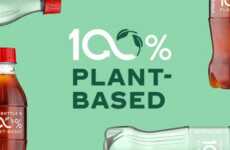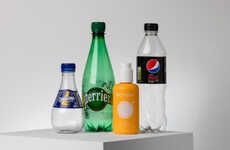
L'Oréal is Making Plastic Bottles from Industrial Carbon Emissions
Laura McQuarrie — November 3, 2020 — Eco
References: premiumbeautynews & loreal
L'Oréal is working with carbon recycling company biotech LanzaTech and fuel company Total to produce new kinds of sustainable shampoo bottles. Industrial carbon emissions are now being captured to create the cosmetic plastic bottle of its kind, which offers an alternative to bio-plastics derived from sugarcane.
Creating the sustainable shampoo bottles is a three-step process. First, LanzaTech captures industrial carbon emissions and converts them into ethanol. Then, Total transforms the ethanol so that it can be used by L’Oréal to produce the plastic packaging.
As Jacques Playe L’Oréal Packaging & Development Director, says: "We have the ambition to use this sustainable material in our bottle of shampoo and conditioner by 2024 and we hope other companies will join us in using this breakthrough innovation."
Image Credit: L'Oréal
Creating the sustainable shampoo bottles is a three-step process. First, LanzaTech captures industrial carbon emissions and converts them into ethanol. Then, Total transforms the ethanol so that it can be used by L’Oréal to produce the plastic packaging.
As Jacques Playe L’Oréal Packaging & Development Director, says: "We have the ambition to use this sustainable material in our bottle of shampoo and conditioner by 2024 and we hope other companies will join us in using this breakthrough innovation."
Image Credit: L'Oréal
Trend Themes
1. Carbon-based Packaging - Exploring the use of carbon emissions as a sustainable alternative for plastic packaging.
2. Industrial Carbon Recycling - Repurposing carbon emissions from industrial processes for sustainable product development.
3. Sustainable Packaging Solutions - Finding eco-friendly alternatives for traditional plastic packaging through innovative production methods.
Industry Implications
1. Beauty and Personal Care - Exploring the use of sustainable materials in cosmetic packaging to reduce plastic waste and carbon footprint.
2. Petroleum and Chemicals - Investigating the potential for utilizing carbon emissions for sustainable product development or manufacturing in the industry.
3. Renewable Energy - Identifying ways to harness renewable energy sources and apply them to sustainable product development in various industries.
4.2
Score
Popularity
Activity
Freshness























